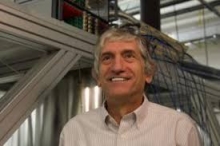EECS Seminar: Quantum Supremacy Using a Programmable Superconducting Processor

Professor
UCSB Department of Physics and Google
Abstract: The promise of quantum computers is that certain computational tasks might be executed exponentially faster on a quantum processor than on a classical processor. We have used a programmable superconducting processor to create quantum states on 53 qubits, corresponding to a "parallel computation" of 10 million trillion states. For a simple algorithm, the Google Sycamore processor takes about 200 seconds to run a quantum circuit a million times - the equivalent task for a state-of-the-art classical supercomputer would take approximately 10,000 years. This dramatic increase in speed compared to all known classical algorithms is an experimental realization of quantum supremacy, heralding a much-anticipated computing paradigm.
Bio: John Martinis did pioneering experiments in superconducting qubits in the mid-1980s for his doctoral thesis. He has worked on a variety of low temperature device physics during his career, focusing on quantum computation since the late-1990s. He was awarded the London Prize in Low temperature physics in 2014 for his work in this field. From 2014 to 2020 he worked at Google to build a useful quantum computer, culminating in a quantum supremacy experiment in 2019.
Host: Payam Heydari
Share
Upcoming Events
-
MSE 298 Seminar: Molecular Modeling in the Age of AI - From Energy Materials to Device Simulations
-
MAE 298 SEMINAR: Europa Clipper Mission Design
-
CBE 298 Seminar: Metal Electrodeposition for Modern Mineral Refining
-
MSE 298 Seminar: Quasi-1D/2D Charge-Density-Wave Materials - From Exotic Physics to Application Prospects
-
EECS Seminar: Steering Diffusion Models for Generative AI, From Multimodal Priors to Test-Time Scaling
